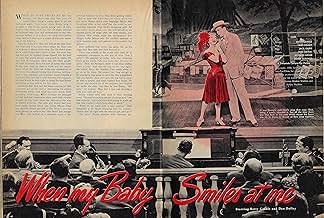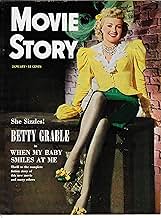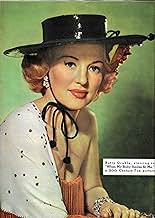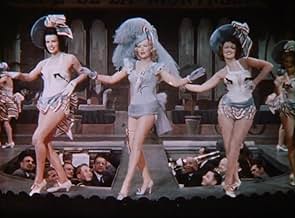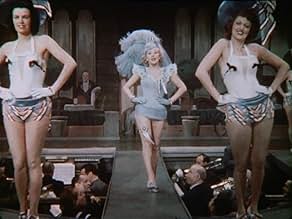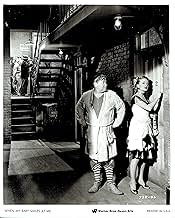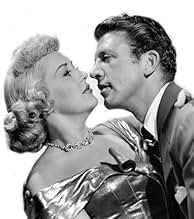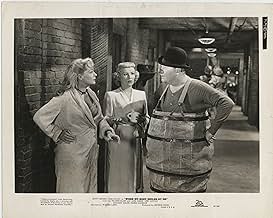Añade un argumento en tu idiomaVaudeville performers, Dailey and Grable, have marital difficulties when he hits the "Big Time", which are compounded by his drinking problem.Vaudeville performers, Dailey and Grable, have marital difficulties when he hits the "Big Time", which are compounded by his drinking problem.Vaudeville performers, Dailey and Grable, have marital difficulties when he hits the "Big Time", which are compounded by his drinking problem.
- Dirección
- Guión
- Reparto principal
- Nominado para 2 premios Óscar
- 3 nominaciones en total
Louise Allen
- Dancer
- (sin acreditar)
Maxine Ardell
- Dancer
- (sin acreditar)
Dorothy Babb
- Specialty Dancer
- (sin acreditar)
Betty Jane Barton
- Dancer
- (sin acreditar)
Pati Behrs
- Woman in Box
- (sin acreditar)
Sam Bernard
- Process Server
- (sin acreditar)
Lela Bliss
- Woman
- (sin acreditar)
Harry Carter
- Man in Box
- (sin acreditar)
Edward Clark
- Box-Office Clerk
- (sin acreditar)
Joanna Dale
- Chorus Girl
- (sin acreditar)
Grace Davies
- Dancert
- (sin acreditar)
Reseñas destacadas
I saw this movie several times on television back in the 1970s, so my comments come from a rather distant memory. This film was typical of 20th Century Fox's output of Betty Grable films during the mid to late 1940s. A remake of Paramount's and Hal Skelly's DANCE OF LIFE (1929) and a further remake by Paramount in 1937 called SWING HIGH, SWING LOW starring Carole Lombard, the story is all about an alcoholic burlesque performer, played by Dan Dailey, who brings down not only himself but also his wife, played by Grable. Jack Oakie, June Haver, James Gleason, and Richard Arlen (!) are also in it. The most vivid memory I have of the film is Dan Dailey's Oscar nominated performance. I remember being impressed by him and finding him both believable and sympathetic. His performance lifts the film above the average Betty Grable nostalgia vehicle. The two stars were always good together, even though the material was usually recycled and mundane, sometimes wallowing in nostalgia and overproduction. Most feel Dailey's nomination for the Oscar a travesty: he took the place that many feel belonged to Humphrey Bogart in TREASURE OF THE SIERRA MADRE. Bogart certainly deserved recognition for his work in that film, but Dailey's work here also warrants mention.
Directed by Walter Lang (of course), it's based on the play BURLESQUE.
Directed by Walter Lang (of course), it's based on the play BURLESQUE.
Betty Grable and Dan Dailey fare quite well in this musical comedy-drama which, initially, appears to have come straight off the '40s-era assembly line at 20th Century-Fox Studios. Based on the play "Burlesque" by Arthur Hopkins and George Manker Watters, the atypically complicated plot concerns a married couple, stage performers in the 1920s, who are separated after the husband gets a shot on Broadway and the wife gets stuck behind on the road. The twosome remain devoted to each other until it leaks in the press he has been spending lots of free time with a pretty new co-star--the wife's nemesis! Grable wears a cockamamie hairdo throughout (and her only good song, "What Did I Do?", is hampered by poor choreography), though she's sweet in her backstage scenes, joshing with pals Jack Oakie and June Havoc, and playing flattered star to handsome admirer Richard Arlen. Dailey, on the other hand, received an Oscar nomination for his work, and it's easy to see why; walking a fine line between pathos and comedy, he's portraying a talented alcoholic, desperate to keep the peace while needing an outlet for his own frustrations (one senses he isn't so much insecure as he is a grown-up child who needs a firm, upstanding mother-figure to guide him). The picture doesn't really get into the masochism build into the plot's formula. Grable can see that her husband "Skid" is on the skids, floundering and helpless--his own worst enemy--yet Grable's loving responses to him are a tad bit insane. Sure, she's noble by lending a helping hand, but the movie-makers equate her kind gestures with a selflessness that goes beyond the call of duty. Betty isn't an enabler, per se--the point is made that her unconditional devotion will turn everything right again--but how many people actually bought this 'happy ending'? I didn't find it very convincing, but 1948 was really too early for Hollywood musicals to become dark and probing. For its time, this was probably just the tonic for matinée audiences hoping to shake the blues away. **1/2 from ****
In general, this movie is just a fair musical and drama with a touch of comedy. But, two things raise it a couple of notches and give it historical value. The first is its excellent picture of vaudeville. The second is its portrayal of alcoholism and early social views about it.
"When My Baby Smiles at Me" is one of the best movie exposés of vaudeville. It shows what it was like for performers who made a living traveling in such stage shows of the late 19th and early 20th centuries in the U.S. and Canada. It shows the various types of entertainment - comedy, song and dance, burlesque, small dramatic acts and skits, that made up vaudeville. Some also had acrobats, magic and animal acts.
By the mid-20th century, burlesque had faded from the scene and TV combined with the movies to end the reign of vaudeville. But a form of revue shows continued to be popular on TV where they became known as variety shows. The Ed Sullivan Show reigned as king of this type of entertainment from June 1948 to June 1971. Only then, the talent competition was much greater and the quality of entertainers was always high. Song and dance and comedy remained the chief forms of entertainment, but acrobatics had a new venue for such talent formerly seen only in circuses. And, trained animals and special talents and skills of all kinds were regularly featured.
In this movie, the cast does a fine job in showing the backstage angst about late performers, and the hustle and bustle of actors as they quickly change makeup and costumes between sets to hurry onto stage for their next act. Betty Grable and Dan Dailey aren't a match for Ginger Rogers and Fred Astaire. But they are good in this film, and show us what in that time would have been considered very good or top entertainment on the vaudeville circuit. Likewise with Jack Oakie and June Havoc.
Then, there's Dailey's performance as Skid Johnson, who has a drinking problem. And Grable's role as Bonny Kane, his wife, who doesn't know what to do and can't make him stop drinking. The film isn't long enough to have included more of the picture of the entertainer in his slide from heavy drinking to alcoholism. That would have included more than his being habitually late for show starts. He would have begun to forget a line or two, perhaps slur a line, stagger noticeably, forget things the next day.
But, in the throes of his addiction, Johnson is the picture of the helpless and forlorn alcoholic. His portrayal is very real. Many viewers may miss some of the telltale signs of alcoholism shown here. Those who have personal experience with it will note some of the signs beyond the amount and frequency of Johnson's drinking. Particularly poignant is the scene in which Johnson says that he went to pieces when Bonny left him. That's a common trait of alcoholic denial, excuse and blame. He puts it elsewhere - on his wife. Those of us with experience in 12-step programs know this as the "poor me" attitude. It oozes self-pity and smothers any need for one to come to grips with his or her own culpability.
But, there's more to the "treatment" of alcoholism than that in this movie. The film takes place in the 1920s. That was during prohibition when speakeasies flourished across America. It was also before the birth of 12-Step programs to treat addictions. Alcoholics Anonymous got its start in 1935, and spread widely only after World War II.
The film shows Bonny Kane unable to do anything to stop Johnson's drinking or tackle his alcoholism. She falls into a trap and role that continues to enable the alcoholic to be what he is. It's interesting that the movie doesn't ever use the words alcoholic or alcoholism. Even when Johnson is in a hospital ward at New York's Bellevue Hospital, there's no mention of alcoholism.
Dailey's performance overall was excellent of an alcoholic personality. He promises to quit and has his last drink, but doesn't follow through. He hides empty bottles. He doesn't hesitate to offer someone else a drink or have one when someone else suggests it. He has no remorse about his boozing or its effect on his wife. But he does love her. That's the insidiousness of alcoholism. In the hospital and later, he genuinely looks to be suffering from the disease. The only obviously unbelievable scene is at the end when Skid Johnson has all the energy and vitality to do the last song and dance number with Bonny Kane.
Dailey received his only Oscar nomination for his role in this film, and it was well deserved. But for Laurence Olivier's "Hamlet" in 1948, Dan Dailey may well have won the best actor Oscar that year.
"When My Baby Smiles at Me" is one of the best movie exposés of vaudeville. It shows what it was like for performers who made a living traveling in such stage shows of the late 19th and early 20th centuries in the U.S. and Canada. It shows the various types of entertainment - comedy, song and dance, burlesque, small dramatic acts and skits, that made up vaudeville. Some also had acrobats, magic and animal acts.
By the mid-20th century, burlesque had faded from the scene and TV combined with the movies to end the reign of vaudeville. But a form of revue shows continued to be popular on TV where they became known as variety shows. The Ed Sullivan Show reigned as king of this type of entertainment from June 1948 to June 1971. Only then, the talent competition was much greater and the quality of entertainers was always high. Song and dance and comedy remained the chief forms of entertainment, but acrobatics had a new venue for such talent formerly seen only in circuses. And, trained animals and special talents and skills of all kinds were regularly featured.
In this movie, the cast does a fine job in showing the backstage angst about late performers, and the hustle and bustle of actors as they quickly change makeup and costumes between sets to hurry onto stage for their next act. Betty Grable and Dan Dailey aren't a match for Ginger Rogers and Fred Astaire. But they are good in this film, and show us what in that time would have been considered very good or top entertainment on the vaudeville circuit. Likewise with Jack Oakie and June Havoc.
Then, there's Dailey's performance as Skid Johnson, who has a drinking problem. And Grable's role as Bonny Kane, his wife, who doesn't know what to do and can't make him stop drinking. The film isn't long enough to have included more of the picture of the entertainer in his slide from heavy drinking to alcoholism. That would have included more than his being habitually late for show starts. He would have begun to forget a line or two, perhaps slur a line, stagger noticeably, forget things the next day.
But, in the throes of his addiction, Johnson is the picture of the helpless and forlorn alcoholic. His portrayal is very real. Many viewers may miss some of the telltale signs of alcoholism shown here. Those who have personal experience with it will note some of the signs beyond the amount and frequency of Johnson's drinking. Particularly poignant is the scene in which Johnson says that he went to pieces when Bonny left him. That's a common trait of alcoholic denial, excuse and blame. He puts it elsewhere - on his wife. Those of us with experience in 12-step programs know this as the "poor me" attitude. It oozes self-pity and smothers any need for one to come to grips with his or her own culpability.
But, there's more to the "treatment" of alcoholism than that in this movie. The film takes place in the 1920s. That was during prohibition when speakeasies flourished across America. It was also before the birth of 12-Step programs to treat addictions. Alcoholics Anonymous got its start in 1935, and spread widely only after World War II.
The film shows Bonny Kane unable to do anything to stop Johnson's drinking or tackle his alcoholism. She falls into a trap and role that continues to enable the alcoholic to be what he is. It's interesting that the movie doesn't ever use the words alcoholic or alcoholism. Even when Johnson is in a hospital ward at New York's Bellevue Hospital, there's no mention of alcoholism.
Dailey's performance overall was excellent of an alcoholic personality. He promises to quit and has his last drink, but doesn't follow through. He hides empty bottles. He doesn't hesitate to offer someone else a drink or have one when someone else suggests it. He has no remorse about his boozing or its effect on his wife. But he does love her. That's the insidiousness of alcoholism. In the hospital and later, he genuinely looks to be suffering from the disease. The only obviously unbelievable scene is at the end when Skid Johnson has all the energy and vitality to do the last song and dance number with Bonny Kane.
Dailey received his only Oscar nomination for his role in this film, and it was well deserved. But for Laurence Olivier's "Hamlet" in 1948, Dan Dailey may well have won the best actor Oscar that year.
Dan Dailey is a hoofer who goes from burlesque houses to Broadway, leaving wife Betty Grable behind. When she catches up with him, he's developed a drinking problem.
It's the third big-screen version of Hopkins-Watter play Burlesque, and it's given the Technicolor gloss that the company gave to all of Miss Grable's musicals in the period. The musical numbers are baggy-pants affairs. It's directed by Walter Lang, Fox's specialist for musical dramas, but since it's a vehicle for Miss Grable, everything is sunny.
Dailey was nominated for the Oscar for Best Actor. For some reason, he lost to Laurence Olivier's performance in a little number called HAMLET.
It's the third big-screen version of Hopkins-Watter play Burlesque, and it's given the Technicolor gloss that the company gave to all of Miss Grable's musicals in the period. The musical numbers are baggy-pants affairs. It's directed by Walter Lang, Fox's specialist for musical dramas, but since it's a vehicle for Miss Grable, everything is sunny.
Dailey was nominated for the Oscar for Best Actor. For some reason, he lost to Laurence Olivier's performance in a little number called HAMLET.
One point for the technicolour costumes, 1 point for Betty Grable and 1 point for the uptempo song and dance numbers even though Dan Dailey manages to completely murder the song "Don't Bring Lulu".
Dailey (Skid) is a vaudeville entertainer along with wife Betty Grable (Bonny). He gets an opportunity elsewhere but messes up and returns to play happy families.....Wow......how boring was that! The cast are unlikable apart from Grable but even she demonstrates unreasonable and unrealistic behavioural traits when it comes to her relationship with Dailey. This film gave my wife cushion rage which manifested itself at the end of the film. We wanted to like this film but just couldn't. I dozed off as it was so boring. Dailey was nominated for an oscar!!!!!!!!!! WTF!!!! It's a corny load of nonsense.
Dailey (Skid) is a vaudeville entertainer along with wife Betty Grable (Bonny). He gets an opportunity elsewhere but messes up and returns to play happy families.....Wow......how boring was that! The cast are unlikable apart from Grable but even she demonstrates unreasonable and unrealistic behavioural traits when it comes to her relationship with Dailey. This film gave my wife cushion rage which manifested itself at the end of the film. We wanted to like this film but just couldn't. I dozed off as it was so boring. Dailey was nominated for an oscar!!!!!!!!!! WTF!!!! It's a corny load of nonsense.
¿Sabías que...?
- Curiosidades"Lux Radio Theater" broadcast a 60 minute radio adaptation of the movie on April 25, 1949 with Betty Grable and Dan Dailey reprising their film roles.
- Citas
'Skid' Johnson: Here's to you babe. One man's loss is another man's gain.
- ConexionesFeatured in Grandes biografías: Betty Grable: Behind the Pin-up (1995)
Selecciones populares
Inicia sesión para calificar y añadir a tu lista para recibir recomendaciones personalizadas
Detalles
- Duración1 hora 38 minutos
- Relación de aspecto
- 1.37 : 1
Contribuir a esta página
Sugerir un cambio o añadir el contenido que falta

Principal laguna de datos
By what name was When My Baby Smiles at Me (1948) officially released in Canada in English?
Responde
